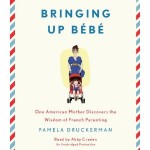French Parents are Not Superior. But They Do Have an Awful Lot Right. (“Bringing Up Bebe” Book Review, Part I)
 I remember being told that making assumptions got you into trouble. (Remember that old saw: When you ASSUME you make an ASS out of YOU and ME, which is one of those plays on words that never felt terribly clever to me.)
I remember being told that making assumptions got you into trouble. (Remember that old saw: When you ASSUME you make an ASS out of YOU and ME, which is one of those plays on words that never felt terribly clever to me.)
When I became a parent, though, I made a whole mess of assumptions. I assumed my babies would eat and sleep well; I assumed they’d be fine with the caregivers I chose for them; I assumed that they (probably) wouldn’t stick their fingers into electrical sockets and would eventually be able to eat a whole banana without having it cut into teeny-tiny chunks.
I assumed that my babies — though they’d obviously change a lot of things enormously (some forever, some temporarily) — would eventually fit themselves into my life, a life already long in progress. Not the other way around. That assumption, in fact, is the heart of my Mean Mom philosophy: It’s not my job to re-arrange the world to suit my children; it’s my job to prepare my children to go out into (and take on) the world. And that starts from the first squall of a newborn.
As it turns out, now that I’m about half-way through the new book by Pamela Druckerman called Bringing Up Bebe, my sorta-kinda calm assumptions that my boys would (had to, if I’m being honest) do things like nap reliably and sleep through the night, and eat what we offered them, and seamlessly (or somewhat seamlessly, after an adjustment period) just, you know, go with the flow, was quite French of me.
If you have not heard of this new book, you are possibly living very quietly off the grid someplace, so let me enlighten you: Druckerman, a former reporter for the Wall Street Journal, moved to Paris with her British husband, and had a baby (three, eventually). A typical type-A, earnest, anxious American, she was shocked to see that the French mamans she met didn’t fret nearly so much as she expected about many aspects of parenting. The French babies “did their nights” from an early age, without the need for painful cry-it-out training! French kids sat in restaurants politely! French mothers went back to work without a shred of guilt (and with the time to have gotten their figures back). And one of my favorites, French kids ate their meals and didn’t snack all day long.
Surprised, impressed, and incredulous, Druckerman set out to write about it. Hot on the heels of the Tiger Mom, the press Druckerman’s book got tended toward the sensational, starting with an excerpt that appeared in her old paper, the WSJ, with the provocative title Why French Parents Are Superior.
Which is just custom designed, right, to raise the hackles of your typical, Type-A, earnest, anxious American parent (and also a fair amount of Type-B, relaxed, easygoing American parents). Remember Freedom Fries? What is it about the French? I used to live in the U.K., and I gotta tell you, many Brits, too, don’t like what they see as Gallic superiority (even as they travel across the Channel to stock up on wine and stinky cheese).
Yet, that’s not what Druckerman is saying, at least not in the 100-plus pages I’ve read thus far (and I promise another report when I’m all done). I haven’t come across the word “superior,” par example.
But many of the things she reports had me slapping the page and saying some version of, “mon dieu, that’s me!”, which would temporarily rouse my husband, slumbering next to me in bed (and if I needed another reason to love him, I’ll add the fact that he can fall asleep even with my bedside light burning as I read).
French parents, she finds (and she does research to go with her observations) parent within an overarching framework of strictness called cadre, within which the kids have quite a lot of freedom. (Whereas the typical American parent today might not be strict at all, but at the same time might be limiting freedom with obsessive childproofing and helicoptering).
What strikes me is that French parents (or anyway, Parisian parents) aren’t afraid of their kids. And when you’re not afraid (that he couldn’t possibly sleep through the night at 3 or 4 months; that you couldn’t possibly expect your two-year-old to entertain herself for ten minutes at a time; that there’s no way you and your friend can drain an entire cup of coffee while it’s still warm, if your demanding preschoolers are underfoot) you are free to just assume that these things are possible.
I’ve always assumed those things were possible.
See you when I finish Druckerman’s book.
February 29, 2012 @ 1:55 pm
Hey D, Nice blog!! Good luck with it-I know this and the book will be huge!!!!!